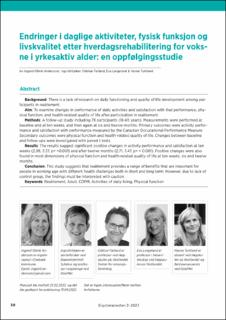| dc.description.abstract | Background: There is a lack of research on daily functioning and quality of life development among par-
ticipants in reablement.
Aim: To examine changes in performance of daily activities and satisfaction with that performance, phy-
sical function, and health-related quality of life after participation in reablement.
Methods: A follow-up study including 78 participants (18-65 years). Measurements were performed at
baseline and at ten weeks, and then again at six and twelve months. Primary outcomes were activity perfor-
mance and satisfaction with performance measured by the Canadian Occupational Performance Measure.
Secondary outcomes were physical function and health-related quality of life. Changes between baseline
and follow-ups were investigated with paired t-tests.
Results: The results suggest significant positive changes in activity performance and satisfaction at ten
weeks (2.98, 3.37, p= <0.001) and after twelve months (2.71, 3.47, p= < 0.001). Positive changes were also
found in most dimensions of physical function and health-related quality of life at ten weeks, six and twelve
months.
Conclusion: This study suggests that reablement provides a range of benefits that are important for
people in working age with different health challenges both in short and long term. However, due to lack of
control group, the findings must be interpreted with caution. | en_US |
